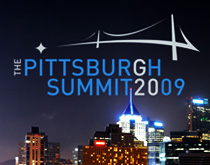
This fall, the excitement of a new school year on the Pittsburgh campus of Carnegie Mellon hasn't been limited to life along Forbes Avenue. On September 24 and 25, President Barack Obama, calling Pittsburgh a symbol of economic recovery, is hosting The Group of Twenty world leaders to The G-20 Pittsburgh Summit.
It has been well documented how Carnegie Mellon embodies the economic transformation of Pittsburgh from an industrial town to an international center of knowledge and innovation. Founded in 1900 by Andrew Carnegie, Carnegie Mellon began as Carnegie Tech, a place to study practical arts and sciences. Carnegie's vision transformed Pittsburgh into a region renowned for its industrial leadership. The city has captured President Obama's attention as it's once again at the forefront of innovation, with Carnegie Mellon driving new industry, creating new jobs creation, and earning an international reputation as an economic engine.
The G-20 was established in 1999 to discuss economic issues. Today, the G-20 represents 85 percent of the world's economy and 66 percent of the world's population. Members include Argentina, Australia, Brazil, Canada, China, France, Germany, India, Indonesia, Italy, Japan, Mexico, Russia, Saudi Arabia, South Africa, South Korea, Turkey, the United Kingdom, the United States, and the European Union.
At the summit, the G-20 leaders are reviewing the recent global economic crisis and considering actions to strengthen the world economy.
Members of G-20 delegations are visiting technology and research centers at Carnegie Mellon as part of a media tour that also includes the University of Pittsburgh and the University of Pittsburgh Medical Center.
For the latest news on the summit's impact both worldwide and at Carnegie Mellon, visit: www.cmu.edu/g20



